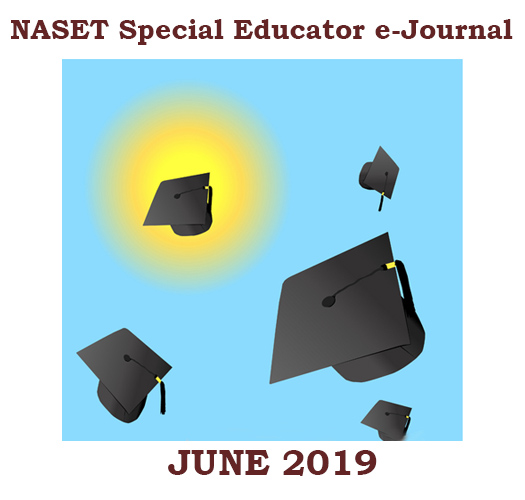June 2019 - Special Educator e-Journal

Table of Contents
- Special Education Legal Alert. By Perry A. Zirkel
- Buzz from the Hub
- Lehigh University Section 504 Coordinators Institute – June 27–28, 2019
- Mediating Parental Advocacy and the School District’s Guidelines. By Karina Constantine
- Oppositional Defiant Disorder Toward Adults and Oppositional Defiant Disorder Toward Peers: Initial Evidence for Two Separate Constructs. By Stephanie M. Estrada
- Supporting Individuals with Significant Disabilities: The Roles of a Job Coach
- The Importance of Parental Advocacy for Children with Disabilities: A Review of the Literature. By Miranda Freites
- The Critical Need for Robust Communication between Schools and Parents of Students with Learning Differences: A Review of the Literature. By Heather-May V. Potter
- Barriers to Parental Involvement in the Individualized Education Plan Process. By Katherine J. Ramirez
- Acknowledgements
NASET Members - Login Below to access the latest Special Educator e-Journal.
Site visitors: You may access a sample e-Journal - Sample e-Journal
Special Education Legal Alert
By Perry A. Zirkel
© May 2019
This month’s update concerns issues that were subject to recent relevant court decisions and are of general significance: (a) the emerging fourth dimension of FAPE—capability to implement the IEP, and (b) the overlapping issues of the procedural and substantive dimensions of FAPE with LRE. Publications relating to both of these issues are available on my website perryzirkel.com.
NASET Members- Login to Access the Full Article
Not a Member? - Join NASET
Buzz from the Hub
All articles below can be accessed through login:
- Hands-On Activity to Identify Your Child’s Strengths
- 5 Ways to Support Siblings in Special Needs Families
- Coping With Incarceration | Sesame Street in Communities
- IEPs: Developing High-Quality Individualized Education Programs
- Best Practices in Self-Advocacy Skill Building
- There’s a Webinar, too!
- Your Journey to Self-Determination
- Promoting Self-Determination in Youth with Disabilities: Tips for Families and Professionals
NASET Members - Login to Access the Full Article
Not a Member? - Join NASET Today!
Lehigh University Section 504 Coordinators Institute – June 27–28, 2019
This two-day program provides the following legal and practical components for an up-to-date professional development experience:
NASET Members - Login to Access the Full Article
Not a Member - Join NASET
Mediating Parental Advocacy and the School District’s Guidelines
By Karina Constantine
This paper will examine the idea of mediating and using parental collaboration as a tool to help teach parents to be better advocates for their children, while not breaking the district’s guidelines. In the paper, five academic articles obtained from the modules within the “Working with Families of Students with Disabilities Through Collaborative Approaches” course, and Library. FIU.edu’s social and psychological, and educational databases on the topic of teacher and parental advocacy, will be reviewed including:
- Improving Parental Involvement: Training Special Education Advocates
- In Parent’s Voices: the Education of Children With Autism Spectrum Disorders.
- Down the Rabbit Hole: A Commentary About research on Parents and Special Education.
- Parents’ Perspectives of Collaboration with School Professionals: Barriers and Facilitators to Successful Partnerships in Planning for Students with ASD.
- Parent-Teacher Collaboration: Teacher Perceptions of What is needed to Support Students with ASD in the Inclusive Classroom.
NASET Members - Login to Access the Full Article
Not a Member? - Join NASET Today!
Oppositional Defiant Disorder Toward Adults and Oppositional Defiant Disorder Toward Peers: Initial Evidence for Two Separate Constructs
By Stephanie M. Estrada
Abstract
Oppositional Defiant Disorder is characterized by the act of defiance and disobedience at its core. In “Oppositional Defiant Disorder Toward Adults and Oppositional Defiant Disorder Toward Peers: Initial Evidence for Two Separate Constructs,” further investigations of implications on the student and educators in the classroom are touched upon to debunk the controversial theory that ODD can simply be directed at an adult or authority figure. A qualitative study takes place to characterize signs and symptoms of the disorder recognized in communication with student peers, educators, and parents alike.
NASET Members - Login to Access the Full Article
Not a Member? - Join NASET
Supporting Individuals with Significant Disabilities: The Roles of a Job Coach
INTRODUCTION
The person who assists individuals with disabilities to find and maintain employment using supported employment services has been referred to by a number of different titles. This includes such titles as employment specialist, employment consultant, personal representative, job developer, job-site trainer, and job coach. Regardless of the title, a job coach wears many different hats when supporting an individual in finding and maintaining employment.
NASET Members - Login to Access the Full Article
Not a Member? - Join NASET Today!
The Importance of Parental Advocacy for Children with Disabilities: A Review of the Literature
By Miranda Freites
Abstract
This paper explored five published articles that report on results from research conducted that highlights the importance of parental advocacy for children with disabilities. Parents of children with disabilities may feel the special education system process to be difficult in navigating and even daunting. When introduced into the special education community not all parents are not guided in learning what can be done to assure the best quality of education for their child. This paper examines the research in relation to the importance of parental advocacy.
Keywords: parent involvement, children with disabilities, advocacy
NASET Members - Login to Access the Full Article
Not a Member? - Join NASET Today!
The Critical Need for Robust Communication between Schools and Parents of Students with Learning Differences: A Review of the Literature
By Heather-May V. Potter
Introduction
In Education there is much discussion of the need for parental involvement to maximize students’ academic achievement as well as positive social-emotional behaviors. It is widely acknowledged that parents are the experts in their own children’s strengths and needs (Starr & Foy, 2012), and that they are “not only the first teachers of children in encouraging their children’s positive personality traits and supporting their developmental areas, but they are also indispensable partners of educators” (Llik & Er, 2019). Varied studies going back to the 1960’s have found that parental involvement in the forms of homework assistance, attendance at school events, and communication with the school provides “immediate, positive results on students’ academic achievement”. This involvement also has positive effects on attendance, drop-out rates, and at-risk behaviors (Burke, 2013). These positive results occur across economic and educational levels. There has been extensive research into this area as it relates to the processes of Special Education, including identification, referral, and programming. Many studies have shown that there are indeed clear, data-based, positive outcomes for both students and schools when educators and parents communicate and collaborate with the shared goal of providing the best possible education to the student. Research has also shown that these school and parent partnerships are hindered by institutional barriers to communication (Burke, 2013; Llik & Er, 2019; Mandic, Rudd, & Acevedo-Garcia, 2012) that must be deliberately and persistently countered by educators if we truly wish to pursue the best outcomes for our students, their families, and our schools.
NASET Members - Login to Access the Full Article
Not a Member? - Join NASET Today!
Barriers to Parental Involvement in the Individualized Education Plan Process
Katherine J. Ramirez
Abstract
Parental involvement in the educational setting has been found to increase the performance of the students, especially in the area of special education (Tamzarin, Menzies, & Ricci, 2012). According to the Individuals with Disabilities Act (IDEA), it is mandatory and essential to include the parents in the Individualized Education Plan (IEP) process in order to fully meet the needs of the students (Jung, 2011), however, parental involvement is not as high as it should be in regard to special education and the IEP process. Through research, it has been found that certain barriers including the communication style, cultural beliefs, and prior knowledge of the IEP process lead to misunderstandings and negative feelings which cause parents to refrain from participating. Through future research, these barriers can be further examined to help increase parental involvement in the IEP process (Tamzarin, Menzies, & Ricci, 2012).
NASET Members - Login to Access the Full Article
Not a Member? - Join NASET
Latest Employment Opportunities Posted on NASET
*Special Education Teacher - Growth Public Schools (GPS) seeks Special Education Teachers to encourage a culture of mutual respect & equitable practice and exhibit knowledge of student cognitive development and various learning. Communicate effectively with students and families about classroom activities and student progress. To learn more - Click here
*Chief Clinical Officer - Criterion Child Enrichment is conducting a search for a Chief Clinical Officer (CCO). Founded in 1985 as a not-for-profit organization, Criterion has served families for over 30 years and is a leading provider of early childhood education and early intervention services in Massachusetts. The Chief Clinical Officer will work in partnership with the agency’s Chief Administrative Officer to oversee operation of programs fulfilling Criterion’s Mission and Strategic Plans. To learn more - Click here
*Rivermont Schools - Special Education TEACHER positions available! - Now is a great time to join Rivermont Schools. Currently offering a $2,000 sign-on bonus and reimbursement of relocation expenses for Special Education Teachers! Rivermont Schools are private, nonprofit, special education day schools with campuses across Virginia. To learn more - Click here
*Student Services Administrator - Monitors compliance with IDEA, ADA, OCR, CRDC, and other relevant Special Education and/or English learner regulations for the purpose of ensuring ECS schools are in compliance with federal and state regulations. Assist in the updating of all policies and procedures for ECS that adheres to mandates pertaining to English learners and students with disabilities. To learn more - Click here
*Special Education Teacher - Cozad Community Schools, an AdvancEd School District, having excellent facilities, utilizing a Professional Learning Community structure, technologically strong, and intent on growing leaders, is accepting applications for a high school special education teacher opening for the 2019-2020 school year. To learn more - Click here
* Coordinator of Learning Services/Learning Specialist - Trinity School is seeking a certified Learning Specialist to lead a small team of specialists in the role of Coordinator of Learning Services. The ideal candidate is one who has taught in a variety of settings; a range of ages; and used different approaches. This person knows about remediation and how to provide strategies for students and teachers through direct and indirect services. To learn more - Click here
*Teacher - Special Education (All Areas) - Approximately 100 positions! - We are looking for highly motivated and skilled talent to join our team at District of Columbia Public Schools (DCPS). We seek individuals who are passionate about transforming the DC school system and making a signifcant difference in the lives of public school students, parents, principals, teachers, and central once employees. To learn more - Click here
*Special Education Teachers - Responsible for providing an educational atmosphere where students have the opportunity to fulfill their potential for intellectual, emotional, physical, spiritual and psychological growth. This person is responsible for organizing and implementing an instructional program that will maximize the learning experience of students with special needs. To learn more - Click here
Acknowledgements
Portions of this or previous month’s NASET’s Special Educator e-Journal were excerpted from:
- Center for Parent Information and Resources
- Committee on Education and the Workforce
- FirstGov.gov-The Official U.S. Government Web Portal
- Journal of the American Academy of Special Education Professionals (JAASEP)
- National Collaborative on Workforce and Disability for Youth
- National Institute of Health
- National Organization on Disability
- Substance Abuse and Mental Health Services Administration
- U.S. Department of Education
- U.S. Department of Education-The Achiever
- U.S. Department of Education-The Education Innovator
- U.S. Department of Health and Human Services
- U.S. Department of Labor
- U.S. Food and Drug Administration
- U.S. Office of Special Education
The National Association of Special Education Teachers (NASET) thanks all of the above for the information provided for this or prior editions of the Special Educator e-Journal
